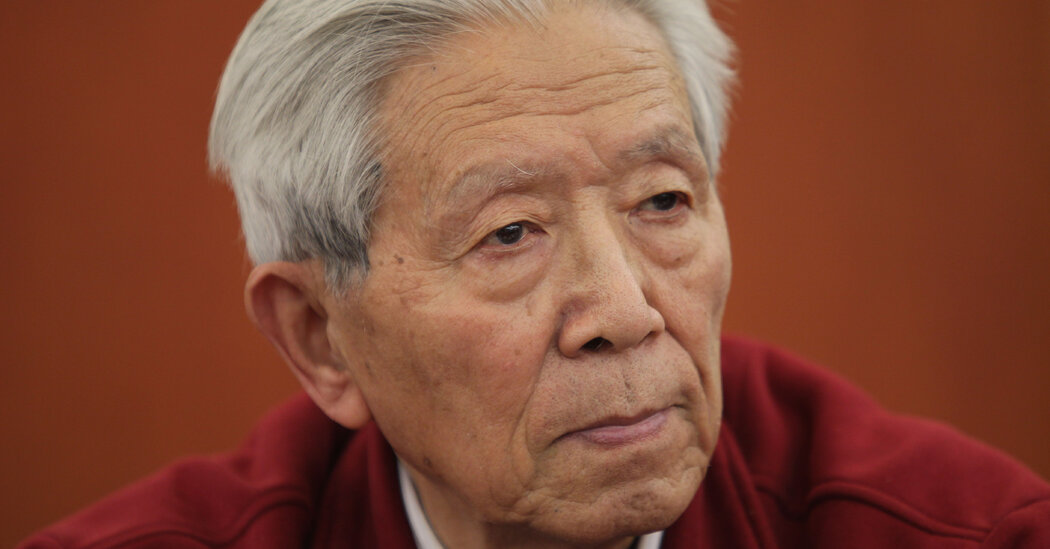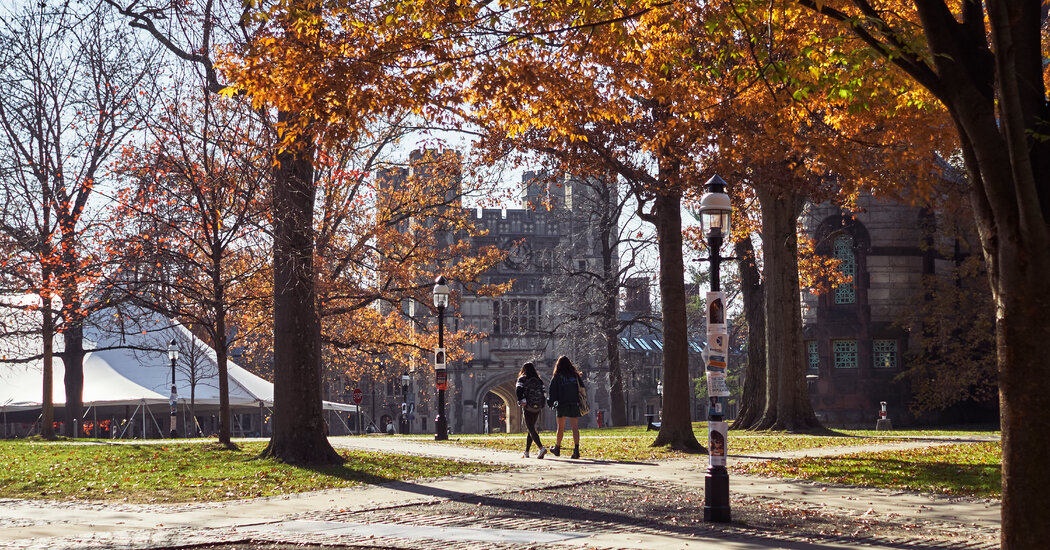Jiang Yanyong, Who Helped Expose China’s SARS Crisis, Dies at 91
A retired military surgeon, he blew the whistle in 2003 on Beijing’s cover-up of the epidemic. He was later punished for denouncing the Tiananmen Square crackdown.Dr. Jiang Yanyong, a prominent military surgeon who became a national hero for exposing the Chinese government’s cover-up of the SARS epidemic in 2003, but was later punished for denouncing the Tiananmen Square crackdown, died on Saturday. He was 91.His death was widely reported by Chinese-language media in Hong Kong and abroad, as well as by friends in China, who shared a notice on social media saying he had succumbed to pneumonia and other illnesses. Two friends of his family told The New York Times that they had confirmed his death with relatives, but both asked not to be identified, fearing recriminations.Chinese state media have not confirmed the news of Dr. Jiang’s death, which is not uncommon for a politically sensitive figure.In the spring of 2003, alarmed to hear health officials downplaying the threat of severe acute respiratory syndrome, or SARS, Dr. Jiang sent a letter to several news organizations refuting the official story. His revelations prompted China’s top leaders to acknowledge that they had provided false information about the epidemic and to begin a nationwide effort to battle it, saving countless lives.“I was telling the truth,” Dr. Jiang later recalled in a 2013 interview with the state-run Beijing News. “I believed the government would treat me fairly.”It did, at least for a while, hailing Dr. Jiang as a hero. But nearly two decades later, the Chinese authorities would go on to virtually repeat the cover-up with the outbreak of Covid-19.Dr. Jiang was retired in 2003 when he heard that many Beijing hospitals, including the elite military hospital where he had worked, were dealing with a surge in patients infected with the SARS virus. By then, SARS was already a full-blown epidemic, spreading to multiple countries and infecting more than 1,000 people in Hong Kong and southern China alone.So it came as a shock to Dr. Jiang when China’s top health minister, Zhang Wenkang, appeared on television, saying that Beijing had only 12 cases of SARS and three deaths.“You are safe here whether you wear the mask or not,” Mr. Zhang said. “Beijing is perfectly safe to visit for business or pleasure.”Stunned by those blatantly misleading remarks, Dr. Jiang sat down the next day and wrote his letter, saying that there were already over 100 cases in Beijing alone. The lanky, elderly doctor accused Mr. Zhang, who had also been trained as a military doctor, of “abandoning even his most basic standards of integrity as a doctor.”A waitress, left, being admitted to the SARS ward of a hospital in Guangzhou, in southern China, in 2004.China Photo ASW, via ReutersAs a Communist Party member who held a rank corresponding to major general in the United States, Dr. Jiang was taking a huge risk. Nonetheless, he signed his name and sent the letter off to several local media outlets. Foreign journalists soon caught wind of it, and Time magazine broke the news.The impact was immediate.World Health Organization inspectors quickly extended a trip to Beijing to inspect the hospitals where Dr. Jiang said there were hidden cases, putting pressure on the government. Chinese leaders fired Mr. Zhang, the health minister, and the mayor of Beijing.For a brief period, Dr. Jiang received nationwide acclaim. One local magazine called him the “honest doctor.”“His goal wasn’t to make China lose face,” his daughter, Jiang Rui, said later in an interview. “He just saw that he had a chance to save lives.”But the next year, emboldened by his new political capital, he wrote a letter to top Chinese leaders, calling on them to acknowledge that the 1989 crackdown on the Tiananmen Square pro-democracy protests had been wrong, and that the student movement had in fact been a “patriotic movement.”Dr. Jiang wrote about what he’d seen at No. 301 Military Hospital in Beijing on the night that tanks rolled into the square and People’s Liberation Army soldiers began shooting indiscriminately at student protesters. Scores of wounded civilians were rushed to the hospital, he said. Many had been hit by bullets designed to break apart after impact and shred internal organs.It was the bloodiest night of his decades-long career.“My brain buzzed and I almost passed out,” he recalled. “Lying before me this time were our own people, killed by children of the Chinese people, with weapons given to them by the people.”Soon after the letter became public, Dr. Jiang and his wife were detained. He was forced to undergo lengthy interrogation and indoctrination sessions. For years, he was barred from leaving China and periodically subjected to monitoring, harassment and house arrest. He all but disappeared from public view.World Health Organization experts in 2004, checking a building where SARS was suspected to have been spread. China Photos ASW, via ReutersJiang Yanyong was born on Oct. 4, 1931, in the eastern Chinese city of Hangzhou to a wealthy banking family. Growing up in Shanghai, he resolved to become a doctor after watching his aunt succumb to tuberculosis. In 1949, the year Mao Zedong’s Communists took power, he enrolled in Yenching University to study medicine and went on to train at Peking Union Medical College, the country’s most prestigious medical school.Inspired by Norman Bethune, a Canadian doctor who died on the front lines of the Communist resistance to the Japanese occupation in 1939, he enlisted in the People’s Liberation Army and specialized in surgery. In 1957, he was assigned to No. 301 Hospital in Beijing.He became known for his precision, steady hands and willingness to take on difficult cases, earning him the nickname “Brave Jiang.”But his idealism didn’t last long. In 1966, Mao unleashed the Cultural Revolution, the decade-long period of chaos that upended Chinese society. Groups of militant youths known as Red Guards roved the country, determined to root out “class enemies.” Dr. Jiang, whose father had been a banker and whose cousin was an official in the rival Nationalist party in Taiwan, was an easy target.Branded a counterrevolutionary, he was imprisoned, beaten and later sent to a prison farm for five years in the remote deserts of Qinghai Province in western China, away from his wife and children. After he was politically rehabilitated in the early 1970s, he returned to No. 301 hospital, where he eventually worked his way up to chief of surgery.He retired in the early 2000s, but he continued to treat patients and mentor younger doctors. In 2004, he was awarded the prestigious Ramon Magsaysay Award for Public Service in recognition of his “brave stand for truth in China, spurring lifesaving measures to confront and contain the deadly threat of SARS.”In addition to Ms. Jiang, his daughter, he is survived by his wife, Hua Zhongwei, and a son, Jiang Qing.Dr. Jiang never backed down on the subject of Tiananmen Square. In 2019, before the 30th anniversary of the crackdown, he wrote a letter to Xi Jinping, China’s leader, again demanding justice for the “crime” of 1989. Soon after, the 87-year-old doctor was again under house arrest.Like others who challenged Communist Party policy, he was largely erased from the official record, and he was sometimes painted as a wrongdoer for having spoken out.A multiple-choice question posed by a test-prep school in 2017 asked about his decision to come forward about SARS. The “correct” answer was B: Doing so was wrong because it harmed the interests of the nation, the society and the community, and he should be subject to legal punishment.“All I did was say a few honest things,” said Dr. Jiang, pictured in 2004. Hu Jia/Associated PressSuch priorities still seemed to hold sway in late 2019, when a new coronavirus was emerging in China. A doctor in the central city of Wuhan, Li Wenliang, posted a warning to a group of fellow doctors about the still-unidentified disease, which he said resembled the SARS virus.The government reprimanded Dr. Li and forced him to renounce his warning. As the epidemic grew, government officials continued to underplay the coronavirus’s threat, delaying efforts to contain it, with global ramifications.When Dr. Li died of Covid, he was mourned across China as someone who had spoken truth to power, as Dr. Jiang had done before him.“I’m not a hero,” Dr. Jiang said in the 2013 interview. “All I did was say a few honest things.”“If everyone spoke the truth, then there would be nothing to hide,” he added. “If everyone spoke the truth, the country would naturally be better off.”Chris Buckley
Read more →

